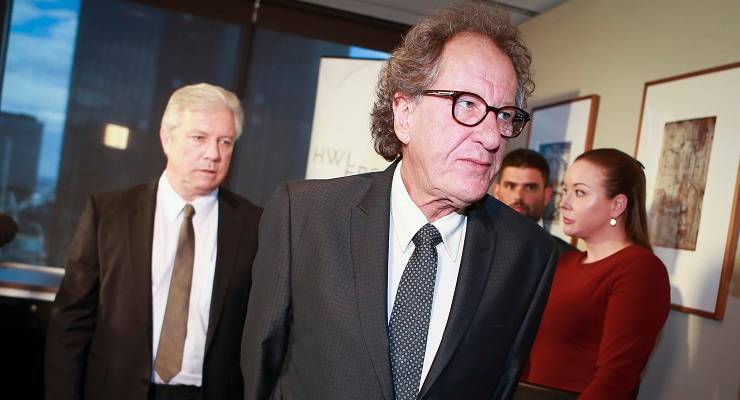
This is act four in Inq’s series on the media trial of Geoffrey Rush. Read the full series here.
“The situation is intolerable and I must now seek vindication of my good name”
Geoffrey Rush launched defamation proceedings against The Daily Telegraph by reading slowly and deliberately from a prepared statement in the Melbourne city offices of his law firm HWL Ebsworth on December 8, 2017, just days after the “King Leer” story landed:
“The Daily Telegraph has made false, pejorative and demeaning claims, splattering them with unrelenting bombast on its front pages. This had created irreparable damage to my reputation, has been extremely hurtful to my wife, my daughter and my son, and to my extended family as well as to many colleagues in the film, television and theatre industry. The situation is intolerable and I must now seek vindication of my good name through the courts.”
News Corp, through its Nationwide News subsidiary, responded with two defences: truth and qualified privilege. But within weeks of the pre-trial hearing, its truth defence had been thrown out by Justice Michael Wigney, who was critical of News Corp from the beginning:
“Because the particulars provided no meaningful details of the alleged touching, and how and why the touching made the actress feel uncomfortable, it could not be concluded that they were capable of proving the substantial truth of the statements that Mr Rush engaged in ‘scandalously inappropriate’ behaviour or ‘inappropriately touched’ the actress.”
“They failed essentially because their witness wasn’t believed,” Crikey commentator and partner at Marque Lawyers Michael Bradley noted.
This left Nationwide relying on just one defence: qualified privilege. Qualified privilege contends that privilege exists between a person who has a duty to make a claim, and the audience who has an interest in receiving it — it can’t be motivated by malice, and both parties have to act reasonably.
The trial date was pushed from September 2018 to October, then again to December as actor Eryn Jean Norvill, who had originally raised the anonymous complaint about Rush’s behaviour, agreed to testify on The Daily Telegraph’s behalf.
It was a huge get for the publication, but her decision, which followed months of refusal and reluctance, was questioned by Wigney.
Three weeks out from the trial, News Corp’s team was searching for more people to testify against Rush. In-house lawyer Michael Cameron, while on holiday in California, reached out to actress and producer Karen Elise Baldwin, who had worked with Rush on a film in 2003.
“Dear Ms Baldwin,” Cameron wrote. “I am an attorney from Australia. I am currently visiting the United States to investigate an incident involving the actor Geoffrey Rush on the set of ‘Swimming Upstream’, a film that you co-produced. Would it be possible to speak with you?”
There was no response from Baldwin, but the team’s efforts were successful on a local level when King Lear co-star Colin Moody agreed to testify that he had heard show director Neil Armfield tell Rush one of the scenes had become “creepy”. (During the trial, Armfield told the court he had said no such thing.)
But it was too late. Evidence had to be finalised a full two months earlier, and Wigney refused to allow Moody onto the witness list. News Corp had just four witnesses lined up.
In stark comparison, Rush’s roll-call of 13 character-witnesses was an impressive line up Australia’s industry veterans, including actor John Gaden, Kath & Kim producer Robyn Kershaw and renowned theatre director Simon Phillips.
Meanwhile, back at the Australian Academy of Cinema and Television (AACTA), CEO Damien Trewhella was having second thoughts about having asked Rush to step aside as president. He emailed his board proposing they apologise to Rush and reverse their decision, because “our organisation is built off critical partnerships and sponsorships that are heavily reliant on our access to talent … A very serious and major risk has been created”.
The AACTA board agreed, and sent Rush this letter:
“There are no excuses, other than erroneous judgement on our part … Put simply Geoffrey: We Want You Back and we hope you can find a way to agree, under any terms you may like to propose.”
The single board dissenter was seasoned TV producer Anita Jacoby, describing the letter as “an obsequious apology”. But Rush never reclaimed his role as president and, 18 months after Jacoby refused to sign the apology, she was voted off the AACTA board.
Next: The trial begins









Crikey encourages robust conversations on our website. However, we’re a small team, so sometimes we have to reluctantly turn comments off due to legal risk. Thanks for your understanding and in the meantime, have a read of our moderation guidelines.